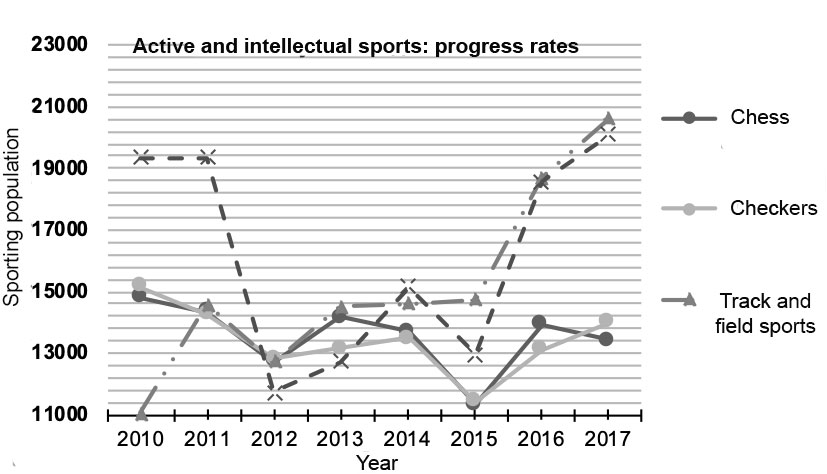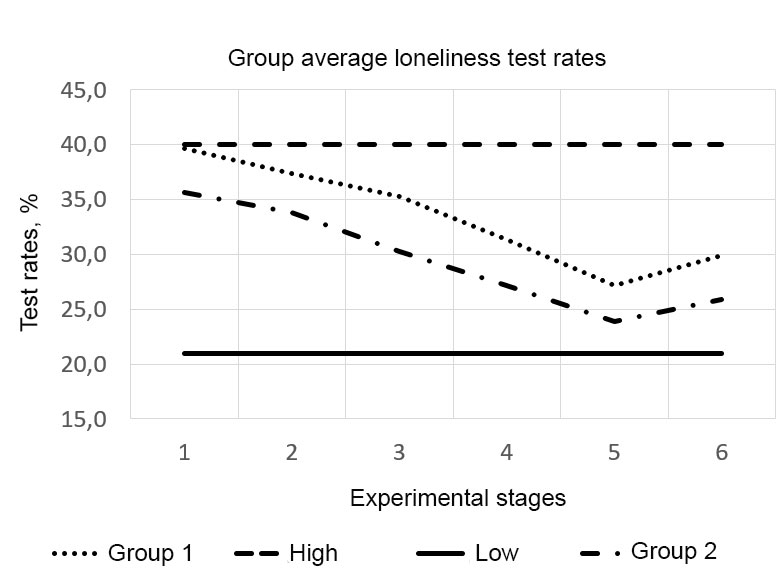Psychological and educational support service to chess players with health impairments in trainings and competitions
ˑ:
PhD, Associate Professor I.V. Mikhaylova
Russian State Social University, Moscow
Keywords: adaptive chess sport, adaptive chess training system, psychological and training support service, test technology
Background. One of the key objectives of the National Physical Education and Sports Development Strategy for the period up to 2020 is to ensure 20% of the people with health limitations being covered by the Physical Education and Sports service system; however, the progress surveys found the cover-age rate lagging at least two times behind the reference figure so far [5], and the situation needs to be addressed by the reserve mobilizing initiatives. Given on Figure 1 are the reported progress statistics of the Ministry of Sports of the Russian Federation for the most popular adaptive sport disciplines includ-ing both the active sports (track and field sports, swimming etc.) and intellectual sports (chess, check-ers) in the period of 2010 through 2017 [7].

Figure 1. Progress statistics of the adaptive sport disciplines for the period of 2010 through 2017
We may assume that the 2016-17 plateau on the sporting population curve needs to be changed to a growth trend to attain the strategic target by 2020. It should be mentioned that the modern adaptive chess sport models offer an integrated personality development service, with the athletes’ physicality improved by special exercises, and psychophysical conditions by the relevant technical and tactical training (TTT) tools. As demonstrated by the best national and international experiences, the integrat-ed progress should be secured by an efficient psychological and training support service.
Objective of the study was to offer a new psychological and training support service model for train-ings and mass/ elite competitions of chess players with health impairments.
Methods and structure of the study. We analyzed for the study purposes the following: (1) valid le-gal and regulatory provisions of the Ministry of Sports and the Russian and International Chess Feder-ations for the chess training service; (2) theoretical and practical national and foreign study reports on the sports psychological and training support service [2, 6, 8]; (3) best practical experiences of the psy-chological and training support service to chess players with health impairments accumulated by the online Chess Planet system; Alexeyevsky and Yuzhnoportovy Local Sport Service Centers in Moscow; Psycho-neurological Boarding School #24 in Moscow [3]; and the Russian State Social University (RSSU) that acted as the federal center for the inclusive chess training models in the period of 2005-2015 [1, 4]. The new psychological and training support service model testing experiment was designed to apply the following methods: questionnaire surveys; monitoring; and interviews of the athletes and trainers. Progress of the sample with health impairments was rated by the mental/ intellectual/ physical qualities and skills tests.
Results and discussion. Adaptive chess sport (that is still not listed in the Paralympic, Deaf and Spe-cial Olympic Game programs), applies the relevant medical and sport functionality classifications, with the athletes classified by the musculoskeletal, auditory and visual system disorders plus intellectual retardations [2]. The psychological and training support service in adaptive chess sport is generally designed to offer harmonized psychological and training provisions for the individual training and competitive progress securing technology that basically includes primary tests, progress planning, practical training and progress testing stages, with the psychological and training support service bene-fits being rated to effectively customize the applied training methods, tools and goals. The individual psychological and training support service technologies are applicable to the chess players with a wide variety of health impairments albeit customizable to the actual diagnoses to secure the most efficient model design and attain the training goals.
Table 1. Frame psychological and training support service designs for the chess players with health impairments
|
Service facility |
Period
|
Sport system
|
Psychological and training support forms |
Numbers |
Trainer categories |
Diagnoses |
|
|
Trainees |
Trainers |
||||||
|
Chess Planet website |
2005 -2008
|
Elite sports: basic training stage |
Full time; remote |
28 |
1 |
Trainer |
MSSD; OVSD |
|
LSSC |
2009 -2010 |
Mass/ health/ recreational sports |
Full time |
211 |
62 |
Trainer; volunteers; trainees’ families; social tutors; psychologist |
MSSD; OVSD |
|
PNBS |
2012 -2015 |
Mass/ health/ recreational sports |
Full time |
20 |
12 |
Trainer; volunteers; trainees’ families; social tutors; psychologist |
IR |
|
RSSU |
2012 -2015 |
Mass school/ academic sports |
Full time; remote |
1018 |
4 |
Trainer; volunteers |
MSSD; OVSD |
Note: MSSD musculoskeletal system disorders; IR intellectual retardations; OVSD auditory/ visual system disorders; LSSC Local Social Service Center; PNBS Psycho-neurological Boarding School
Given in above Table 1 are the frame psychological and training support service designs for the chess players with health impairments. Every player was so highly motivated that there was no outflow from the chess groups in the study period. Trainer’s service critical for success of the adaptive training pro-cess may be categorized into the purely training component to advance the technical and tactical skills and the psychological conditioning component geared to motivate the trainee and control his/her psy-chophysical status. It should be emphasized that the key role is played by the training component sup-ported by the psychological one. The trainer shall customize the training system to the individual needs and progress forecasts of the trainees by the prudently classified and controlled training materials in the traditional and electronic formats; and test the trainee’s progress to secure the individual competitive progress goals being attained. The psychological support service may be provided also by the trainee’s family members, volunteers, psychologists and social tutors for success in the chess sport.
The adaptive chess training process was supported by the Spielberg-Khanin State-Trait Anxiety Inven-tory (STAI) tests; WAM (wellbeing, activity and mood) tests; D. Russel and M. Ferguson Loneliness Test at the Chess Planet website and LSSC. The health sports service at the LSSC was designed to welcome the trainees’ families and volunteers to support, customize and individualize the training pro-cess to attain the adaptive chess sport service goals. Volunteering in the psychological and training support service to the chess players with health disorders were the RSSU faculty members, students and post-graduates having chess sport qualifications and international chess titles. Trainees from among the RSSU students were additionally tested by the Life Quality (Short Form-36) Tests. It should be also emphasized that the modern inclusive training models may be highly beneficial for the psychological and training support service improvement purposes as verified by our practical experience – with the inclusive trainings at the RSSU Chess Center kindly contributed by S.A. Karyakin, A.K. Inarkiev, Ya.A. Nepomnyashiy, O.A. Gyrya and V.Y. Gunina, the Olympic, World and European Chess Champions.

Figure 2. Loneliness test data of the chess players trained at the LSSC clubs
Given on Figure 2 are the loneliness test data profiles of the chess players trained at the LSSC clubs – as provided by 6 progress tests. Group 1 was composed of the underage disabled athletes trained at Alexeyevskiy LSSC; and Group 2 – of the disabled adults trained at the Yuzhhoportoviy LSSC. In the training process with the psychological and training support service (phases 1-4) the both groups were tested with falls in the loneliness sentiments. Tests 5 and 6 (when the health/ recreational chess sport trainings with the psychological and training support service were over) showed the loneliness senti-ments growing again.
Conclusion. In methodological terms, the modern psychological and training support service shall set the individual training process missions and goals and offer customizable methods and tools for the adaptive chess sport, with the trainees’ progress in the technical and tactical domains tested by the rel-evant test methods to facilitate, among other things, their intellectual progress and improvements in the key personality qualities. Trainers managing the psychological and training support service to the trainees with health impairments shall give a due priority to modern interdisciplinary training models, with the training systems and tools sensitively customized to the individual diagnoses and ages. Psy-chological and training support service shall be considered a non-linear and variable component of the adaptive chess sport as it needs to be sensitive to every diagnosis, age and psychosomatic quality of the players with health disorders.
References
- Alifirov A.I., Mikhaylova I.V., Makhov A.S., Belov M.S. Teoreticheskie i prakticheskie aspekty vnedreniya shakhmat v rossiyskoy shkole [Introducing chess education in Russian school system: theoretical and practical aspects]. Teoriya i praktika fiz. kultury. 2018. no. 5. pp. 53–55.
- Evseev S.P. Teoriya i organizatsiya adaptivnoy fizicheskoy kultury [Theory and organization of adaptive physical education]. Textbook. Moscow: Sport publ., 2016. 616 p.
- Mikhaylova I.V., Alifirov A.I. Shakhmaty dlya lits s narusheniyami psikhicheskogo i intellektualnogo razvitiya [Chess game application for people diagnosed with mental and intellectual disorders]. Teoriya i praktika fiz. kultury, 2017, no. 3, pp. 46-47.
- Safiulin E.M., Alifirov A.I. Vliyanie igry v shakhmaty na funktsionalnoe sostoyanie invalidov [Impact of game of chess on functional status of persons with musculoskeletal disorders].Teoriya i praktika fiz. kultury, 2016, no. 7, p. 52.
- Strategiya razvitiya fizicheskoy kultury i sporta v Rossiyskoy Federatsii na period do 2020 g. [Strategy of development of physical culture and sports in the Russian Federation for the period until 2020]. [Electronic resource]. Ministry of Sport RF [Ofit. site]. Available at: http://www.minsport.gov.ru/activities/federal-programs/2/26363/ (date of access: 22.12.2018).
- Stepanova O.N., Makhov A.S., Latushkina E.N., Bernina J.S. Upravlencheskaya deyatelnost trenera: vidy, ob'ekty, kriterii effektivnosti [Coach's management activities: types, objects, performance criteria]. Teoriya i praktika fiz. kultury. 2016. no. 3. pp. 66–68.
- Statisticheskaya informatsiya [Statistical information]. [Electronic resource] Ministry of Sport RF [Ofit. site]. Available at: http://www.minsport.gov.ru/sport/physical-culture/statisticheskaya-inf/ (date of access: 24.12.2018).
- Training in chess: A scientific approach [Electronic resource] Semanticscholar.org / [Ofit. site].
- Available at: http:// pdfs.semanticscholar.org/e2dd/31c7db68667f1485f80d0e5a3ebb65fd960d.pdf / (date of access: 21.12.2018).
Corresponding author: chessy07@mail.ru
Abstract
The study analyzes and offers psychological and training support (PTS) service model for trainings and mass/ elite competitions of the chess players with health impairments. The authors analyzed the valid legal and regulatory framework for the adaptive chess sport; and summarized the best practical experience of the psychological and training support service to chess players with health impairments accumulated by the online Chess Planet system; Alexeyevsky and Yuzhnoportovy Local Sport Service Centers (LSSC) in Moscow; Psycho-neurological Boarding School #24 (PNBS)in Moscow; and the Russian State Social University (RSSU). The study data and analyses made it possible to: (1) Outline the key design logics for the psychological and training support service to the chess players with health impairments; (2) Develop a frame psychological and training support service model customizable to the individual diagnoses and training/ competitive needs; (3) Offer sets of tests and correction tools for the psychological and training support service to chess players with health impairments applicable in the national mass and elite chess sports; and (4) Overview the ways to improve efficiency of the psy-chological and training support service to chess players with health impairments.



 Журнал "THEORY AND PRACTICE
Журнал "THEORY AND PRACTICE